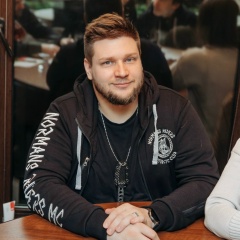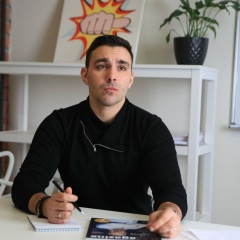Однажды ко мне в купе (вагоны были уже забиты до отказа) положили раненого полковника. Старший военный врач, командовавший погрузкой, сказал мне: — Возьмите его. Я не хочу, чтобы он умер у меня на пункте. А вам все равно. Дальше Пскова он не дотянет. Сбросьте его по дороге. — А что у него? — Пуля около сердца. Не смогли вынуть— инструментов нет. Ясно? Он так или иначе умрет. Возьмите. А там — сбросите... Не понравилось мне все это: как так — сбросить? Почему умрет? Как же так? Это же человеческая жизнь.
И вот, едва поезд тронулся, я положил полковника на перевязочный стол. Наш единственный поездной врач Зайдис покрутил головой: ранение было замысловатое. Пуля, по-видимому, была на излете, вошла в верхнюю часть живота и, проделав ход к сердцу и не дойдя до него, остановилась. Входное отверстие— не больше замочной скважины, крови почти нет. Зайдис пощупал пульс, послушал дыхание, смазал запекшуюся ранку йодом и, еще раз покачав головой, велел наложить бинты. — Как это? — вскинулся я. — А так. Вынуть пулю мы не сумеем. Операции в поезде запрещены. И потом — я не хирург. Спасти полковника можно только в госпитале. Но до ближайшего мы доедем только завтра к вечеру. А до завтра он не доживет. Зайдис вымыл руки и ушел из купе. А я смотрел на полковника и мучительно думал: что делать?
И тут я вспомнил, что однажды меня посылали в Москву за инструментами. В магазине хирургических инструментов «Швабе» я взял все, что мне поручили купить, и вдобавок приобрел длинные тонкие щипцы, корнцанги. В списке их не было, но они мне понравились своим «декадентским» видом. Они были не только длинными, но и кривыми и заканчивались двумя поперечными иголочками. Помню, когда я выложил купленный инструмент перед начальником поезда Никитой Толстым, увидев корнцанги, он спросил: — А это зачем? Вот запишу на твой личный счет — будешь платить. Чтобы не своевольничал.
И вот теперь я вспомнил об этих «декадентских» щипцах. Была не была! Разбудив санитара Гасова (он до войны был мороженщиком), велел ему зажечь автоклав. Нашел корнцанги, прокипятил, положил в спирт, вернулся в купе. Гасов помогал мне. Было часа три ночи. Полковник был без сознания. Я разрезал повязку и стал осторожно вводить щипцы в ранку. Через какое-то время почувствовал, что концы щипцов наткнулись на какое-то препятствие. Пуля? Вагон трясло, меня шатало, но я уже научился работать одними кистями рук, ни на что не опираясь. Сердце колотилось, как бешеное. Захватив «препятствие», я стал медленно вытягивать щипцы из тела полковника. Наконец вынул: пуля!
Кто-то тронул меня за плечо. Я обернулся. За моей спиной стоял Зайдис. Он был белый как мел: — За такие штучки отдают под военно-полевой суд,— сказал он дрожащим голосом. Промыв рану, заложив в нее марлевую «турунду» и перебинтовав, я впрыснул полковнику камфару. К утру он пришел в себя. В Пскове мы его не сдали. Довезли до Москвы. Я был счастлив, как никогда в жизни! В поезде была книга, в которую записывалась каждая перевязка. Я работал только на тяжелых. Легкие делали сестры. Когда я закончил свою службу на поезде, на моем счету было тридцать пять тысяч перевязок!
— Кто этот Брат Пьеро? — спросил Господь Бог, когда ему докладывали о делах человеческих. — Да так... актер какой-то,— ответил дежурный ангел.— Бывший кокаинист. Господь задумался. — А настоящая как фамилия? — Вертинский. — Ну, раз он актер и тридцать пять тысяч перевязок сделал, помножьте все это на миллион и верните ему в аплодисментах. С тех пор мне стали много аплодировать. И с тех пор я все боюсь, что уже исчерпал эти запасы аплодисментов или что они уже на исходе. Шутки шутками, но работал я в самом деле как зверь...
Александр Вертинский, «Дорогой длинною»
И вот, едва поезд тронулся, я положил полковника на перевязочный стол. Наш единственный поездной врач Зайдис покрутил головой: ранение было замысловатое. Пуля, по-видимому, была на излете, вошла в верхнюю часть живота и, проделав ход к сердцу и не дойдя до него, остановилась. Входное отверстие— не больше замочной скважины, крови почти нет. Зайдис пощупал пульс, послушал дыхание, смазал запекшуюся ранку йодом и, еще раз покачав головой, велел наложить бинты. — Как это? — вскинулся я. — А так. Вынуть пулю мы не сумеем. Операции в поезде запрещены. И потом — я не хирург. Спасти полковника можно только в госпитале. Но до ближайшего мы доедем только завтра к вечеру. А до завтра он не доживет. Зайдис вымыл руки и ушел из купе. А я смотрел на полковника и мучительно думал: что делать?
И тут я вспомнил, что однажды меня посылали в Москву за инструментами. В магазине хирургических инструментов «Швабе» я взял все, что мне поручили купить, и вдобавок приобрел длинные тонкие щипцы, корнцанги. В списке их не было, но они мне понравились своим «декадентским» видом. Они были не только длинными, но и кривыми и заканчивались двумя поперечными иголочками. Помню, когда я выложил купленный инструмент перед начальником поезда Никитой Толстым, увидев корнцанги, он спросил: — А это зачем? Вот запишу на твой личный счет — будешь платить. Чтобы не своевольничал.
И вот теперь я вспомнил об этих «декадентских» щипцах. Была не была! Разбудив санитара Гасова (он до войны был мороженщиком), велел ему зажечь автоклав. Нашел корнцанги, прокипятил, положил в спирт, вернулся в купе. Гасов помогал мне. Было часа три ночи. Полковник был без сознания. Я разрезал повязку и стал осторожно вводить щипцы в ранку. Через какое-то время почувствовал, что концы щипцов наткнулись на какое-то препятствие. Пуля? Вагон трясло, меня шатало, но я уже научился работать одними кистями рук, ни на что не опираясь. Сердце колотилось, как бешеное. Захватив «препятствие», я стал медленно вытягивать щипцы из тела полковника. Наконец вынул: пуля!
Кто-то тронул меня за плечо. Я обернулся. За моей спиной стоял Зайдис. Он был белый как мел: — За такие штучки отдают под военно-полевой суд,— сказал он дрожащим голосом. Промыв рану, заложив в нее марлевую «турунду» и перебинтовав, я впрыснул полковнику камфару. К утру он пришел в себя. В Пскове мы его не сдали. Довезли до Москвы. Я был счастлив, как никогда в жизни! В поезде была книга, в которую записывалась каждая перевязка. Я работал только на тяжелых. Легкие делали сестры. Когда я закончил свою службу на поезде, на моем счету было тридцать пять тысяч перевязок!
— Кто этот Брат Пьеро? — спросил Господь Бог, когда ему докладывали о делах человеческих. — Да так... актер какой-то,— ответил дежурный ангел.— Бывший кокаинист. Господь задумался. — А настоящая как фамилия? — Вертинский. — Ну, раз он актер и тридцать пять тысяч перевязок сделал, помножьте все это на миллион и верните ему в аплодисментах. С тех пор мне стали много аплодировать. И с тех пор я все боюсь, что уже исчерпал эти запасы аплодисментов или что они уже на исходе. Шутки шутками, но работал я в самом деле как зверь...
Александр Вертинский, «Дорогой длинною»
Once a wounded colonel was put in my compartment (the cars were already packed to capacity). The senior military doctor in charge of the loading told me: “Take it.” I do not want him to die at my point. But you don’t care. He cannot reach farther Pskov. Throw it down the road. - And what about him? - A bullet near the heart. Could not take out - no tools. Clear? He will die one way or another. Take it. And there - drop it ... I didn’t like it all: how so - reset it? Why die How so? This is human life.
And so, as soon as the train started, I put the colonel on the dressing table. Our only train doctor Zaidis shook his head: the wound was intricate. The bullet, apparently, was about to run out, entered the upper abdomen and, making a move to the heart and not reaching it, stopped. The inlet is no more than a keyhole, there is almost no blood. Zaydis felt his pulse, listened to his breath, greased the wound with iodine and, shaking his head again, ordered to put on bandages. - Like this? I snapped up. - And so. We cannot take out the bullet. Train operations are prohibited. And then - I'm not a surgeon. You can save the colonel only in the hospital. But we’ll reach the nearest one only tomorrow evening. And until tomorrow he will not live. Zaydis washed his hands and left the compartment. And I looked at the colonel and painfully thought: what to do?
And then I remembered that once I was sent to Moscow for tools. In the Schwabe surgical instruments store, I took everything that I was ordered to buy, and in addition acquired long thin forceps and forceps. They were not on the list, but I liked them with their “decadent” look. They were not only long, but also curved and ended with two transverse needles. I remember when I laid out the purchased tool in front of the train chief Nikita Tolstoy, when I saw the forceps, he asked: “And why?” I’ll write it on your personal account - you will pay. In order not to be arbitrary.
And now I remembered these "decadent" tongs. Was not! After waking up the orderly Gasov (he was an ice cream man before the war), he ordered him to light the autoclave. Found the forceps, boiled, put in alcohol, returned to the compartment. Gasov helped me. It was about three in the morning. The colonel was unconscious. I cut the dressing and carefully introduced the forceps into the wound. After some time, I felt that the ends of the forceps came across an obstacle. Bullet? The car was shaking, I was shaking, but I had already learned to work with one hand, without relying on anything. My heart was pounding like mad. Grabbing the “obstacle”, I began to slowly pull the forceps out of the colonel’s body. Finally pulled out: a bullet!
Someone touched my shoulder. I turned around. Zaydis stood behind me. It was white as chalk: “They give for such things to a military court,” he said in a trembling voice. After washing the wound, putting gauze “turunda” in it and bandaging it, I injected Colonel camphor. By the morning he came to his senses. In Pskov, we did not surrender it. Drove to Moscow. I was happy as never before in my life! The train had a book in which each dressing was recorded. I only worked on heavy ones. The sisters made the lungs. When I finished my service on the train, I had thirty-five thousand dressings on my account!
- Who is this Brother Pierrot? The Lord God asked when they reported on human affairs to him. “Yes ... there’s some kind of actor,” the angel on duty answered. “Former cocainist.” The Lord is thoughtful. - And real as a surname? - Vertinsky. - Well, since he is an actor and has made thirty-five thousand dressings, multiply all this by a million and return him to applause. Since then, they began to applaud a lot. And since then I’m all afraid that I have exhausted these reserves of applause or that they are already running out. No jokes, but I really worked like a beast ...
Alexander Vertinsky, “Dear Long”
And so, as soon as the train started, I put the colonel on the dressing table. Our only train doctor Zaidis shook his head: the wound was intricate. The bullet, apparently, was about to run out, entered the upper abdomen and, making a move to the heart and not reaching it, stopped. The inlet is no more than a keyhole, there is almost no blood. Zaydis felt his pulse, listened to his breath, greased the wound with iodine and, shaking his head again, ordered to put on bandages. - Like this? I snapped up. - And so. We cannot take out the bullet. Train operations are prohibited. And then - I'm not a surgeon. You can save the colonel only in the hospital. But we’ll reach the nearest one only tomorrow evening. And until tomorrow he will not live. Zaydis washed his hands and left the compartment. And I looked at the colonel and painfully thought: what to do?
And then I remembered that once I was sent to Moscow for tools. In the Schwabe surgical instruments store, I took everything that I was ordered to buy, and in addition acquired long thin forceps and forceps. They were not on the list, but I liked them with their “decadent” look. They were not only long, but also curved and ended with two transverse needles. I remember when I laid out the purchased tool in front of the train chief Nikita Tolstoy, when I saw the forceps, he asked: “And why?” I’ll write it on your personal account - you will pay. In order not to be arbitrary.
And now I remembered these "decadent" tongs. Was not! After waking up the orderly Gasov (he was an ice cream man before the war), he ordered him to light the autoclave. Found the forceps, boiled, put in alcohol, returned to the compartment. Gasov helped me. It was about three in the morning. The colonel was unconscious. I cut the dressing and carefully introduced the forceps into the wound. After some time, I felt that the ends of the forceps came across an obstacle. Bullet? The car was shaking, I was shaking, but I had already learned to work with one hand, without relying on anything. My heart was pounding like mad. Grabbing the “obstacle”, I began to slowly pull the forceps out of the colonel’s body. Finally pulled out: a bullet!
Someone touched my shoulder. I turned around. Zaydis stood behind me. It was white as chalk: “They give for such things to a military court,” he said in a trembling voice. After washing the wound, putting gauze “turunda” in it and bandaging it, I injected Colonel camphor. By the morning he came to his senses. In Pskov, we did not surrender it. Drove to Moscow. I was happy as never before in my life! The train had a book in which each dressing was recorded. I only worked on heavy ones. The sisters made the lungs. When I finished my service on the train, I had thirty-five thousand dressings on my account!
- Who is this Brother Pierrot? The Lord God asked when they reported on human affairs to him. “Yes ... there’s some kind of actor,” the angel on duty answered. “Former cocainist.” The Lord is thoughtful. - And real as a surname? - Vertinsky. - Well, since he is an actor and has made thirty-five thousand dressings, multiply all this by a million and return him to applause. Since then, they began to applaud a lot. And since then I’m all afraid that I have exhausted these reserves of applause or that they are already running out. No jokes, but I really worked like a beast ...
Alexander Vertinsky, “Dear Long”


У записи 1 лайков,
0 репостов.
0 репостов.
Эту запись оставил(а) на своей стене Андрей Новолодский





















